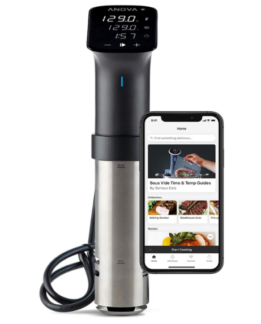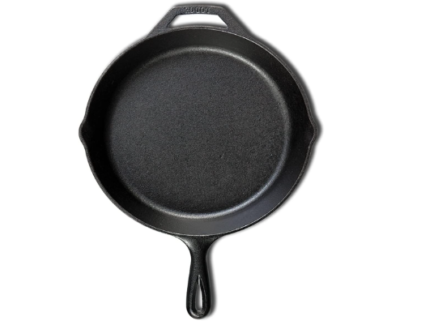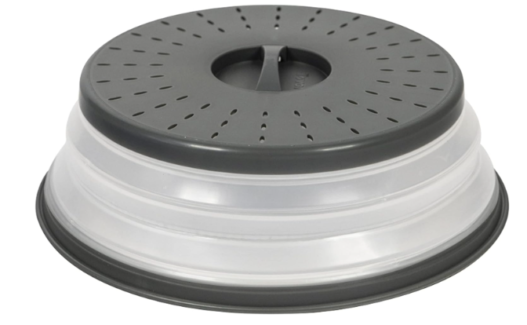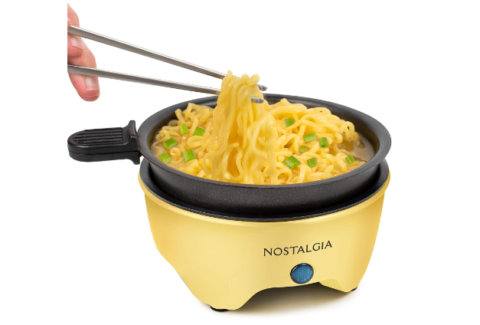The BLACK+DECKER 7-Quart Digital Slow Cooker with Chalkboard Surface, Slate,...
Read More
After World War II, slow cookers became the most popular kitchen appliance as more women began to work outside the home. This innovation made it possible to leave food in the cooker in the morning and return home to a finished meal in the evening. However, given that each meal takes 10+ hours are slow cookers energy efficient?
The heating element in slow cookers uses a shallow current and relies on trapped heat to cook food, making them energy efficient. A slow cooker running for 8 to 9 hours uses approximately 1300 watts, significantly less than the 2,000 to 5,000 watts required by an oven for 60 minutes at 350°F. They reduce evaporation as well.
Many individuals are unaware of the efficiency of slow cookers. Others mistake it for comparable devices, such as pressure cookers. This article covers everything you need to know about slow cookers, including their history, operation, and energy efficiency. We’ll also discuss the advantages and disadvantages of this innovative tool!
A Concise Overview of the Slow Cooker
Irving Nachumsohn is recognized as the inventor of the first slow cooker. However, slow cooking has existed for a great deal longer. The first version was created to prepare Cholent, a traditional Jewish stew. Most Jewish homemakers would cook the stew overnight using the residual heat from a nearby bakery. It was the only way to cook at the time, as Jews do not cook on the Sabbath.
There are dishes from various cultures that can only be prepared using slow cooking techniques. Modern slow cookers evolved from the electric bean pot, and in 1971, the Crock-Pot, a redesigned bean pot, was introduced to the market. In 2009, eighty percent of American households owned one. However, microwaves eventually supplanted slow cookers, which became less prevalent.
In the past decade, slow cookers have made a significant comeback. A culinary revolution primarily fuels the revival. Slow-cooked meats like ribs and pulled pork yield superior results (a delectable fall off the bone). Additionally, modern slow cookers are much more energy efficient.
Today, there is an entire community of enthusiasts and hobbyists, and you can also find excellent slow-cooking recipes to try.
How Does a Slow Cooker Save Electricity?
Slow cookers are identical to other common cooking appliances; they plug into an electrical outlet like an oven. A typical slow cooker operates on 120-volt AC current ranging from 0.6 to 2.0 amps. The only distinction is that it consumes considerably less energy than an oven. However, the exact amount will vary based on the cooking conditions.
Modern slow cookers have three settings: high, low, and off. The low setting consumes approximately 70 watts, whereas the high setting can consume up to 250 watts. Slow cookers cook continuously, in contrast to the oven. To determine the total electricity consumed, multiply the wattage by the duration. The longer a meal is cooked, the more energy it consumes.
Nevertheless, the average consumption is still considerably less than that of an oven. An oven at 176.7°C (350°F) consumes between 2,000 and 5,000 watts for approximately 60 minutes of cooking. When preparing multiple dishes, the expense increases. Slow cookers, such as Crock-Pots, allow you to cook multiple dishes simultaneously.
The Conclusion: Slow Cookers Are Efficient
Slow cookers consume less energy than most other cooking options. Low-wattage heating coils that consume the same power as a bulb provide heat. When this heat reaches the food for an extended period, the food simmers and evenly cooks.
If you desire maximum energy efficiency, you can purchase a slow cooker that can be programmed. But the timer setting allows the stove to automatically turn off and on, thereby conserving additional energy units; turn it off until you need to use it.
How Much Does Using a Slow Cooker Cost?
Having established that slow cookers are energy-efficient, we can now compare them to other commonly used kitchen appliances. The comparison chart below demonstrates that slow cookers are superior to other standard electrical devices.
Pressure Cooker vs. Slow Cooker
A pressure cooker is the closest appliance to a slow cooker in terms of energy efficiency. Approximately eight times more energy efficient is a slow cooker.
Slow Cooker vs. Microwave Oven
Compared to the average 1700-watt microwave oven, a slow cooker is approximately fourteen times more energy efficient.
Slow Cooker vs. Electric Stovetop
A slow cooker is roughly twenty-five times more energy efficient than a typical 2000-watt stovetop.
Slow Cooker vs. Conventional Oven
A slow cooker is approximately twenty-nine times more energy-efficient than a standard 3,500-watt electric oven.
Slow Cooker Energy Efficiency Comparison Chart
| Slow Cooker | Pressure Cooker | Microwave | Electric Stovetop | Conventional |
Usage | 6 hours daily | 6 hours daily | 6 hours daily | 6 hours daily | 6 hours daily |
Appliance | 120 watts | 1,000 watts | 1700 watts | 3,000 watts | 3,500 watts |
Daily | 0.72 kWh | 6 kWh | 10.2 kWh | 18 kWh | 21 kWh |
Annual | 112.32 kWh | 936 kWh | 1,591.2 kWh | 2,808 kWh | 3276 kWh |
Annual Running | $22.46 | $187.20 | $318.24 | $561.60 | $655.20 |
How Does a Slow Cooker Work?
A typical slow cooker consists of three parts:
- The outer shell. These electrical coils are solely responsible for heating the food in the saucepan.
- The container’s interior. The inner container, also known as the “crock,” is made of ceramic and holds the food while it is heated.
- The cover. This dome-shaped piece fits snugly on top to prevent heat loss during cooking.
When it is turned on, the coils heat, which warms the food; since it is fully insulated, no heat escapes into your kitchen. The temperature of the crook gradually rises to a maximum of 148.9°C (300°F). The food slowly simmers and cooks over time. As food heats, it releases steam, effectively trapped by the lid. The added moisture then imparts flavor to the food.
Typically, food at the bottom cooks more quickly than at the top. To take advantage of this, most slow cooker recipes involve layering. Vegetables and other slow-cooking foods are typically placed at the bottom of a casserole dish, while meats are placed on top. Always keep the stove on a stable surface and away from walls as a precaution.
However, the energy efficiency of a slow cooker depends on how you use it. If you repeatedly lift the lid to check on the progress of your recipe, steam will escape. This increases the total cooking time and forces the slow cooker to use more energy to reheat the food. Raising the temperature to be medium or high will also increase the machine’s energy consumption, making it even less energy efficient than usual!
The Caveat
Although slow cookers are energy-efficient, they are not ideal for every cooking scenario. If you forget to turn off a manual slow cooker, it will continue to operate until you turn it off. Not only will the food be significantly overcooked by the time you remove it from the heat, but the electricity consumption will also increase.
Likewise, if the power goes out during a meal, you have limited time to save food. In most cases, the food must be discarded entirely, especially meat, which can quickly become rancid. Ultimately, re-cooking is a waste of money, time, and energy.
Another issue is that not all foods are suitable for slow cooking. For example, dried beans contain toxins that can only be eliminated through high-temperature boiling. Therefore, it must be boiled on the stove before being transferred to the slow cooker.
You cannot rely on a slow cooker for most of your cooking. Even if you use the stove in conjunction with your slow cooker (as in the case of dried beans), you consume more energy!
Are slow cookers energy-efficient? - FAQs
Microwaves, slow cookers and air fryers all tend to be cheaper ways of cooking meals than using an oven,’ Utilita energy expert, Ben Gallizzi, said in a statement.
Cooking with a crock [can be] also very inexpensive when compared to the costs of running an oven. Using my Kill A Watt power meter, I’ve found that a crock pot consumes around 250 watts of power while an [electric] oven can draw up to 4000 watts – depending on how you’re cooking.
Think about how you heat your food – using a microwave is far more energy efficient than cooking on a traditional gas or electric hob when you’re heating up small amounts of food.
Slow cookers are cheap to buy, economical to use and they’re great for making the most of budget ingredients. Make everything from stews, curries and even desserts in an easy to use slow cooker. Just simply add your ingredients and let the machine do the work- perfect for busy weeknights and family dinners.
The short answer is yes. According to Utilita, on the current price cap, slow cookers cost 16p a day to run, which is less than half the price of a gas or electric cooker, making them one of the most cost-effective solutions on the market.
Most energy efficient slow cooker: Swan Oval Stainless Steel Slow Cooker. Best slow cooker for risotto: Sage Risotto Plus Slow/ Multi Cooker. Best sous vide slow cooker: Russell Hobbs Sous Vide Slow Cooker 25630.
It’s estimated that the average slow cooker uses roughly 1.3kWh over eight hours of cooking time. So in order to work out the cost of making your favourite hot winter-time tea, you’ll need to do this equation.
Slow cookers are designed to be left to cook for long periods of time, so the truth is that it’s entirely safe to leave your slow cooker on overnight, if you’re out the house or if you’re at work all day, as long as you follow all the directions and the manufacturer’s instructions.
The pot of the slow cooker usually sits on a base that houses the heating element on the bottom, while Crockpots have their pots inside of a container (or crock) and get heating from all sides. Therefore, slow cookers heat up slower than crockpots, with the heat level higher on the bottom of the pot.
Final Thoughts: Are Slow Cookers Energy-Efficient?
In most situations, a slow cooker is always the most energy-efficient option. However, it is not a replacement for your stove or oven; it merely complements your existing kitchen equipment. They are also very convenient in addition to being energy efficient. A traditional slow cooker makes cooking possible despite a busy lifestyle.
To get the most out of your cooker, choose a programmable model. However, do not anticipate a drastic decrease in your energy bills. You will likely continue to use your other kitchen appliances.
This resource provides one if you need a definition of watts and kilowatts.
Read more:
- 🥖 Piklohas Resharpenable Bread Knife – 7 Powerful Reasons It’s the Best Bread Knife
- Why Chefs Swear by the Mercer Culinary M23210 (Deep Review + Buyer’s Guide)
- Instant Air Fryer 6QT with OdorErase – Your All-in-One Cooking Solution
- De’Longhi Magnifica Evo Next: Honest Review Based on Real Use – What You Need to Know
- 🔥 Dome 2 Air Fryer Review – The Smartest, Fastest, Quietest Air Fryer You’ll Ever Own 🍗💨
Related Posts
Benefits of using a slow cooker
Slow cookers are the best friend of a lazy chef,...
Read MoreBreville BPR700BSS Fast Slow Pro Slow Cooker
The Breville Fast Slow Pro is a stylish multicooker with...
Read MoreInstant Pot Aura 10-in-1 Multicooker Slow Cooker
Advanced Microprocessor Technology is integrated into the Instant Pot Aura...
Read MoreWhy Trust Us
You will find what you are looking for at Jody's Bakery. From classic to luxury brands, you'll find both. We will help you to select appliances that fit your needs, budget and lifestyle. Whether you want to stop by to learn more — or plan to make a major purchase — we’ll treat you like family and assist you every step of the way. Shop with us today to receive friendly and experienced help along the way.
















… [Trackback]
[…] Read More to that Topic: jodysbakery.com/are-slow-cookers-energy-efficient/ […]
… [Trackback]
[…] Here you will find 70787 more Information to that Topic: jodysbakery.com/are-slow-cookers-energy-efficient/ […]
… [Trackback]
[…] Read More on that Topic: jodysbakery.com/are-slow-cookers-energy-efficient/ […]
… [Trackback]
[…] Read More on to that Topic: jodysbakery.com/are-slow-cookers-energy-efficient/ […]
… [Trackback]
[…] There you can find 83050 additional Info to that Topic: jodysbakery.com/are-slow-cookers-energy-efficient/ […]
… [Trackback]
[…] There you can find 68647 more Info to that Topic: jodysbakery.com/are-slow-cookers-energy-efficient/ […]
… [Trackback]
[…] Read More on on that Topic: jodysbakery.com/are-slow-cookers-energy-efficient/ […]
… [Trackback]
[…] Read More here to that Topic: jodysbakery.com/are-slow-cookers-energy-efficient/ […]
… [Trackback]
[…] Find More on on that Topic: jodysbakery.com/are-slow-cookers-energy-efficient/ […]
… [Trackback]
[…] Here you will find 22458 additional Info on that Topic: jodysbakery.com/are-slow-cookers-energy-efficient/ […]
… [Trackback]
[…] Read More to that Topic: jodysbakery.com/are-slow-cookers-energy-efficient/ […]
… [Trackback]
[…] Information on that Topic: jodysbakery.com/are-slow-cookers-energy-efficient/ […]
… [Trackback]
[…] Find More on that Topic: jodysbakery.com/are-slow-cookers-energy-efficient/ […]
… [Trackback]
[…] There you will find 38063 additional Info on that Topic: jodysbakery.com/are-slow-cookers-energy-efficient/ […]